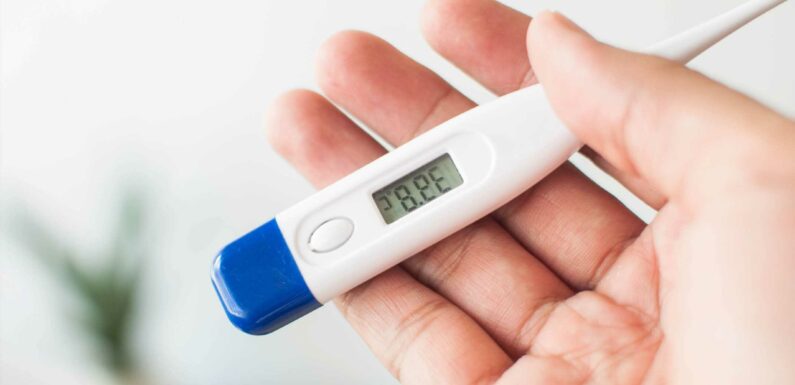
AS the autumn approaches and we all head indoors, more bugs will begin to circulate.
A high temperature can indicate the body is fighting infection, and in some cases, warrants medical attention.
It's likely both you and your child will pick up something over the coming months and you might be left feeling a little hot.
What is a high temperature for an adult and child?
High temperatures can make you very uncomfortable.
Often known as a fever, a high temperature is considered to be anything 38C (100.4F).
The NHS says that the standard body temperature in adults is 37C (98.6F).
Read more on children’s health
What are the symptoms of the ‘highly contagious’ tomato flu in children?
GRACE died aged just 12 after a routine check uncovered horrific truth
However this amount can fluctuate slightly depending on the person’s age, the time of day and the current activity.
It is generally accepted that 36.1C (97F) to 37.2C (99F) is a normal range for body temperature.
But the NHS says if you feel hot or shivery, you may have a high temperature even if a thermometer says your temperature is below 38C (100.4F).
Other signs include sweating or warm, red skin, and your chest or back feeling hotter than usual.
Most read in Health
New type 2 diabetes drug ‘works TWICE as fast – and accelerates weight loss'
I’m terrified to kiss or cuddle my baby – slightest touch leaves him in agony
I was told my heavy periods were just fibroids – now I’m fighting for my life
Woman turns up at A&E complaining of shoulder pain and never leaves
For babies and children, the normal body temperature is 36.4C (97.5F), but again, this can vary slightly.
A high temperature in a child or baby is also 38C (100.4F) or over.
What causes a high temperature?
Lots of things can cause a high temperature and its not usually a sign of anything serious.
A fever is the body's response to a number of illnesses from a common cold to a vaccine, which mimics a virus.
However it can be the sign of something more concerning such as coronavirus, tonsillitis, UTIs, a stomach bug, heat exhaustion, or a vaccine, which mimics a virus.
Cases of RSV (a common cold) and norovirus are also higher than this time of year.
When should I see a doctor?
A high temperature doesn't mean you need to see a doctor, and it usually subsides over three or four days.
Make sure you get plenty of fluids (and look out for signs of dehydration), rest at home and eat some food if you have the appetite. The same goes for children.
But, there are some indications things may be a bit more serious and you need some help.
In adults, you should see a GP if you have severe thirst, have dark or very little urine, you are light-headed or feel weak, you have severe muscle cramps or you have recently been abroad.
Children should be seen by a doctor if there are other symptoms such as a rash.
Warning signs also include that they won't eat, they are not themselves or are dehydrated (dry nappies or sunken eyes), or paracetamol does not help.
Babies under three months should always be seen by a doctor, as well as those under six months with a temperature of 39C (102.2F) or higher.
When to call 999
Sometimes a fever is just one of many symptoms that suggest medical attention is urgently needed.
The NHS says call 999 if your child:
- has a stiff neck
- has a rash that does not fade when you press a glass against it (use the "glass test" from Meningitis Now)
- is bothered by light
- has a fit (febrile seizure) for the first time (they cannot stop shaking)
- has unusually cold hands and feet
- has blue, pale or blotchy skin, lips or tongue
- has a weak, high-pitched cry that's not like their normal cry
- is drowsy and hard to wake
- is extremely agitated (does not stop crying) or is confused
- finds it hard to breathe and sucks their stomach in under their ribs
- is not responding like they normally do, or is not interested in feeding or normal activities
When do you need to seek Omicron advice?
Omicron is a milder variant than other Covid strains that came before it.
Tests are no longer free for the majority of people, but if you can take a test you should.
The government advises that if you have Covid – you should try and stay away from people for five days.
You should also try and stay away from vulnerable people for 10 days.
How can I protect myself from illness?
The best way to prevent catching bugs, including the coronavirus, is to practice good hygiene.
In order to reduce your risk of infection, you should:
- Wash your hands often with soap and water, for at least 20 seconds
- Do not touch your eyes, nose or mouth with unwashed hands
- Avoid close contact with people who are sick
If you have cold-like symptoms, you can help protect others by staying home when you are sick and avoiding contact with others.
Read More on The Sun
Charles is a man wrestling with the weight of history and winning
The Queen’s secret signal using a lipstick revealed by former royal footman
You should also cover your mouth and nose with a tissue when you cough or sneeze then throw it away and wash your hands.
Cleaning and disinfecting objects and surfaces which you may have touched is also important.
Source: Read Full Article







